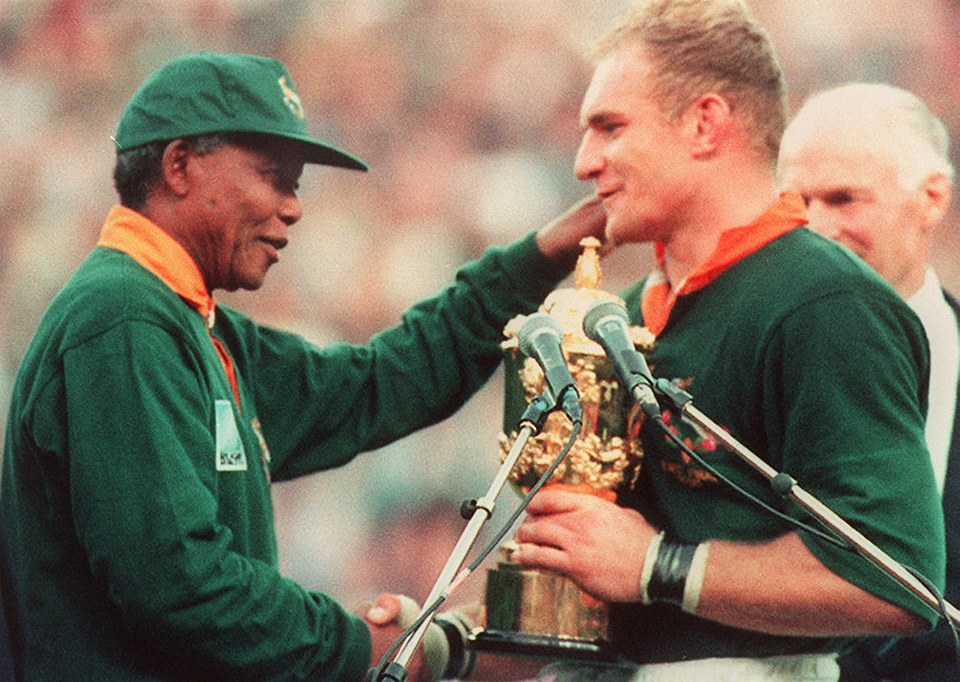Ingresa o regístrate acá para seguir este blog.
@radiobrendan
There’s no doubt that sport can have a very positive impact on society. For one, those who actually engage in a sport generally have much better all-round health than those who don’t.
Then you have the uniting aspect to it. Sports can bring together a diverse range of people and help to break down barriers, especially racial or political ones.

A moment (if only just) of unity: Mandela hands the Webb Ellis trophy to Pienaar. (Photo from Facebook.)
For one, in post-apartheid South Africa, both rugby and football (soccer) were seen as important in this regard. Rugby in the African country had mainly been the preserve of the white elite and the national team, the Springboks, was seen as a symbol of white supremacy for many blacks.
The oval-ball game’s part in helping to ‘build bridges’ came in 1995, when South Africa hosted and won the World Cup. The moment when then president Nelson Mandela — a man who spent decades in prison under white minority rule — walked on to the pitch dressed in a Springbok jersey to present the trophy to team captain Francois Pienaar is etched in history. Black and white, united in sport.
Football’s day came in 2010 when South Africa hosted the Fifa World Cup. Again, a sport that had once represented division — football was predominantly a black affair — brought the country together.
Yet there are many in the Rainbow Nation who feel the transformative powers of those momentous occasions have been exaggerated in some quarters. In other words, once the fanfare died down, things pretty much returned to how they had been — better than the dark days of apartheid for sure but far from an equal country.
Indeed, as much as sport can be seen as a uniting force, it can be just as divisive, too. In the case of another region slowly emerging from a troubled past, sporting splits exist in Northern Ireland. The differences may not be as marked as previously, but rugby is still associated more so with the British nationalist, Protestant community while Irish (Gaelic) football and hurling are chiefly played by those from the Irish nationalist, Catholic tradition.

Um, some people take that ‘locura’, madness, a little too literally. (Photo from Facebook.)
Support of football/soccer in general could be seen as the one commonality between the two. However, the team you follow very much depends on what ‘side’ you come from. Tensions in the terraces and on the pitch are at breaking point when the two ‘tribes’ meet.
Of course such rivalries aren’t unique to current or recent conflict zones. There doesn’t need to be political, racial nor religious differences at play for fierce, and sometimes deadly, sporting clashes to emerge, especially so in the world of football.
Here in Bogotá, authorities are on high alert when you have a Millonarios-Santa Fe derby, to name but one. Only this year in Buenos Aires you had violent scenes that forced the abandonment of the Boca Juniors-River Plate clásico.
Moreover, while we’re often quick to highlight the benefits of playing team sports, they can also instil some very negative practices in people. I’ve seen and been part of what can only be described as on-field violence to the extent that if the same conduct was being carried out on the streets the culprits would be locked up. Damn the rules and sportsmanship when you’re defending your team’s honour.
What all this highlights is that sport, like other things such as politics and religion, can be both a force for good and a force for evil. And in the same way as most other human interests, it comes down to the mindset of the individual in how he or she utilises it.
______________________________________________
Facebook: Wrong Way Corrigan – The Blog & IQuiz “The Bogotá Pub Quiz”.


